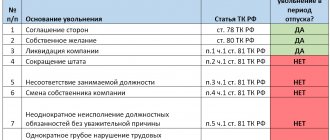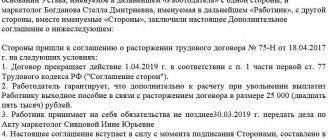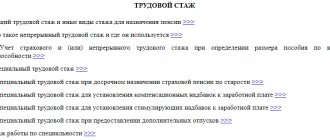During the pension reform in the Russian Federation, a new category of employees appeared - “pre-retirees”. Labor legislation includes such employees as persons who have the right to retire within the next 5 years (upon reaching retirement age). Based on Art. 144.1 of the Criminal Code of the Russian Federation for the unjustified dismissal of pre-retirement employees, the business owner and guilty officials face significant penalties or compulsory labor.
You cannot fire conscientious employees based on age, as this is discrimination. As for pensioners, their dismissal is possible only at their own request, due to retirement, due to inadequacy for the position held, or in the presence of a disciplinary offense. Let's understand the legal nuances of the retirement procedure for employees.
Dismissal of a pensioner at the initiative of the employer
A working pensioner is not limited in any way in his rights compared to other categories of workers.
Age is not a reason for dismissal if there are no other claims against a person’s business qualities (Article 3 of the Labor Code of the Russian Federation). This means that the salary of a working pensioner must continue to be accrued in full in accordance with the employment contract. ATTENTION! Dismissal due to retirement against the will of an employee is discrimination against his or her labor rights. For forced dismissal due to retirement, the employer faces a fine.
Dismissal of a working pensioner, like any other company employee, is legally possible if:
- The company is being liquidated. Read more about this in the material “The procedure for dismissal due to liquidation.”
- The employer is downsizing. Read more here.
- The employee is not suitable for the position held.
- The owner of the organization changes (only the management team can be fired).
- The employee’s guilt has been proven (for example, for appearing at the workplace in a state of intoxication, etc. in accordance with paragraphs 5 and 6 of Article 81 of the Labor Code of the Russian Federation).
- The employee has lost the trust of the employer (for example, if his actions caused damage to the company).
How to dismiss an employee for all the above reasons, read the material “The procedure for dismissing an employee at the employer’s initiative.”
What if we come to an agreement?
An agreement between the parties is the most convenient way to say goodbye to an employee who formally has no reason to be fired. With a pensioner who does not want to enjoy the joys of life without daily work, you need to tactfully talk, explaining the manager’s reasons and offering financial support. Most likely, the wisdom of years will tell the employee that it is not worth fighting for a place in an organization where he is no longer needed. It will take the emotional subtlety of the employer for this conversation to take place without mutual offense.
If an agreement is reached, an agreement is drawn up, on the basis of which the employment contract is terminated.
IMPORTANT! The agreement must reflect the will of both parties and the amount of benefits that the employer will have to pay upon dismissal.
Dismissal of a pensioner by agreement of the parties
In the case where the employer is interested in dismissing a pensioner, but he does not want to leave, a compromise is possible in the form of dismissal by agreement of the parties (Article 78 of the Labor Code of the Russian Federation).
The employee and employer must determine terms that are acceptable to both parties. Before issuing an order, we recommend that you sign a bilateral agreement, which states that the parties have reached mutual agreement, and also indicates the date of the upcoming dismissal and other conditions.
For a sample agreement to terminate an employment contract, see here.
Whether payments upon termination of an employment contract by agreement of the parties need to be subject to personal income tax and contributions, you will learn from the publication “Dismissal by agreement of the parties: personal income tax, contributions . ”
Controversial issues
When deciding on the dismissal of a pensioner without working hours, controversial issues may arise between the parties to the employment contract.
Thus, one of the most common is that many believe that an employee has the right to use the right to a benefit only when he reaches the appropriate age, and if he continues to work further, then he needs to work it off. This does not comply with the law, since there is no mention of any age restrictions or deadlines in the Labor Code of the Russian Federation . In addition, the mere fact of reaching old age does not oblige the employee to receive the appropriate status.
Another controversial point is whether this right can be used several times. This is a very difficult question, the answer to which is not contained in the law. In this case, one should rely on judicial practice, which, however, is quite contradictory. Thus, in this case, each situation requires individual consideration.
Dismissal of a pensioner at his own request
At his own request, a retired employee can leave work at any time. To do this, he just needs to write a statement indicating the date on which he intends to terminate the employment relationship.
The rule of advance (2 weeks) warning to a pensioner does not apply if the basis for dismissal is retirement (Part 3 of Article 80 of the Labor Code of the Russian Federation). That is, the employee must be fired on the date specified in his resignation letter.
For a sample of an employee’s application in connection with retirement, see ConsultantPlus. If you do not have access to the K+ system, get a trial online access for free.
Dismissal due to retirement is formalized by order. An entry is made in the work book: “Dismissed at his own request due to retirement, paragraph 3 of part one of Article 77 of the Labor Code of the Russian Federation.”
In the SZV-TD form, in the “Reason for dismissal” column, also record the entry “Due to retirement”
The pensioner's work has become incomplete
Inconsistency with the position is the main “headache” of the employer associated with retired employees. When a person is no longer able or does not want to work as required, of course, the employer has the right to part with him. But the manager himself is not authorized to objectively assess the job suitability of employees - for this purpose, a special commission is created to certify the employee. If its verdict is “loss of certain skills,” then an employee of retirement age who is no longer suitable for his position must be offered other vacancies that will correspond to his current qualifications. As a rule, these will be lower-level positions that pay significantly less. If the employee disagrees or there are no suitable vacancies, dismissal is lawful.
If an elderly person cannot fully fulfill his duties due to poor health, a verdict from the commission will again be needed - just not the certification one. And the medical one. The employer himself cannot make decisions about whether an employee’s health meets job requirements. The procedure for dismissal after a verdict is the same as in the case of recertification.
Is it possible for a pensioner to be re-dismissed at his own request without working out?
Often, after retiring for a well-deserved rest, pensioners get a job again and, terminating the employment relationship once again, again indicate the reason in the application: “In connection with retirement.” In this case, regardless of what is written in the application, dismissal occurs on general grounds. If the grounds for dismissal are indicated incorrectly in the application, you must ask the employee to rewrite it. If the dismissed person refuses to do this, the manager, affixing the visa on the application, must write: “I don’t mind dismissing on general grounds with 2 weeks of work.”
If a working pensioner leaves without working, and the employer fires him for absenteeism, the court will most likely take the company’s side (appeal ruling of the Moscow City Court dated July 26, 2017 in case No. 33-29119/2017).
ConsultantPlus experts explained in detail how to prepare documents when dismissing a worker due to retirement. To do everything correctly, get trial access to the system and go to the Ready solution. It's free.
The legislative framework
The following concepts are used
| Pensioners | Citizens who have permanent pension provision due to reaching a certain age, preferential or early pensions. They are considered vulnerable and have the right to end their professional career. |
| Severance pay | The final accrual made to the resigning employee. Equal to his average monthly salary. |
| Working off | An employee who wishes to resign must notify the employer in advance (14 days). Then he works out a two-week sentence until he leaves. Read how to legally not work out here. |
| Dismissal | Termination of official labor relations existing between the employee-boss parties within the organization. |
A boss can dismiss an employee based on the content of Article 78.
Is it possible to withdraw an application if dismissal due to retirement has already taken place?
After writing a statement, the employee voluntarily retired. The organization issued an order and fired him from the date specified in the application. After some time, the person changed his mind and wrote a new application, this time about recalling the previous one.
In this situation, the employer has the right to refuse the pensioner, since the employment relationship with the employee has already been terminated. You can only withdraw your own resignation letter within a 2-week notice period. In this case, the employee, as a pensioner, resigned immediately, without warning.
Read more about withdrawing your resignation letter at your own request here.
You can find out how to return over-withheld tax to a fired pensioner by reading the article “Art. 231 Tax Code of the Russian Federation: questions and answers" .
When deadlines are pressing
An employer has the right not to renew an employment contract that has expired, even if it is a contract with an employee who has reached the age of a pensioner. This is another legitimate reason to spend it on vacation.
NOTE! If the contract was drawn up for an indefinite period, then it cannot be terminated without reason.
The employer may offer the employee to enter into a fixed-term contract in order to legally dismiss the employee when the term expires. But forcing an employee to agree to this option will be illegal, which can easily be proven in court. Fixed-term contracts with pensioners should be drawn up exclusively with their voluntary consent!
ATTENTION! Art. 59 of the Labor Code prohibits breaking existing contracts in order to conclude urgent ones in their place!
Shall we look for a compromise?
If you cannot find a justified Labor Code reason for dismissing an elderly employee who is no longer satisfactory to the employer, you can look for a way out in which “both the sheep are safe and the wolves are fed.”
For example, instead of a complete release from a position, you can offer a pensioner to switch to part-time, part-time or a shortened week.
Thus, the employee retains his job and self-respect, and the manager saves on wages and saves experienced “staff”, for example, for mentoring and other functions.
Staff reduction
Financially expensive option. By law, working pensioners are equal to ordinary employees, so they are subject to general requirements.
And they can suddenly fire you if there is a reduction:
· order about the fact of staff reduction;
· timely warning of all persons specified in the order (2 months before the event) ;
· offering similar vacancies to them – if available;
· written consent of those wishing to transfer/written refusal;
· dismissal order.
Then the procedure is carried out in a standard way.
Dismissal procedure
Working pensioners are considered full-time employees . There are certain requirements for them; such citizens cannot be deprived of their jobs without compelling reasons. Usually these are experienced employees who have decades of hard work and a built career behind them. Few companies are willing to voluntarily lose such valuable personnel.
If there is a reduction in staff and the dismissal of a pensioner is inevitable, the employer needs to explain in detail what is happening to employees. An employment agreement can be terminated peacefully only after agreement between the parties.
Find out important things: Dismissal before retirement age - 2021
Payment of benefits to the departing employee is mandatory. The dismissal procedure is formalized in a standard manner; the procedure established by law must be followed. Otherwise, the court will oblige the negligent manager to reinstate the citizen in his position, in addition to paying him compensation, taking into account the time of forced inaction.
If the reason for terminating the contract is layoff and it is unavoidable, the employer may offer an alternative in return. Place a working pensioner in another, similar place. An employee has the right to write a letter of resignation when he is not satisfied with the transfer. A reduction can be made if the employee agrees to it himself.
Without a voluntary decision, a person cannot .
The boss can have a peaceful conversation with the employee and honestly explain to him the reasons for the upcoming dismissal. You cannot threaten, deceive or blackmail.
Retirement age exempts a person from mandatory two-week work.
But it is more profitable for an experienced leader to keep such people in their positions; they can teach the new generation a lot. In addition, they are used to working well, on time and hardworking. Grow professional replacements for yourself.
How to appeal illegal dismissal
A citizen who has been deprived of his job has the right to challenge this by filing a complaint in court. By law, he will have a month to draw up the appropriate claim. The countdown begins from the moment he receives a copy of the dismissal order.
Lost time can be restored if there is a good reason: deteriorating health, force majeure situations.
The process of reinstatement of a citizen through the court:
1. File a claim. Adhering to a business style, state the situation, supporting your arguments with relevant documents. Ask for the return of the lost job, and also oblige the employer to pay him compensation.
It wouldn’t hurt to file a complaint with the labor inspectorate; the response from there will be attached to the statement of claim.
Indicate the dates: the dismissal occurred, the order was received. List all attached documents: dismissal order, calculation, reference. Especially material evidence.
2. An appeal is filed to the local district court according to the registration of the defendant company itself. If it is impossible to go there - the plaintiff is sick, is with a child - send an appeal to the court located at the plaintiff’s place of registration.
3. The judge will listen to the plaintiff and accept the documents. It takes 5 days to study, then the citizen receives a notification . If the claim is accepted, the corresponding legal proceedings . The defendant then receives a copy of the document.
He has the right to notify the court so that the consideration of the case is carried out outside of his participation. You will need to file a petition. This right also applies to the plaintiff.
4. The consideration of the case takes 2 months . As a result, the court decides: to partially/fully fulfill the requirements specified by the plaintiff or to refuse him. It also establishes how much money the defendant must pay the plaintiff. Reinstatement of the position is mandatory.
5. The finished solution gains the necessary strength after another month . The parties have the right to use it to file an appeal or reach a mutually beneficial agreement. Then the court issues the defendant a writ of execution and a copy of the extract.
A citizen can prove his illegal dismissal even by writing a statement in his own hand. Evidence will be required - audio recordings of calls made, videos, recorded witness statements. They reflect facts of blackmail , threats or coercion by the employer of an employee so that he quits.
Then the procedure becomes more complicated. When there are sufficient grounds, it is possible to initiate not an administrative, but a full-fledged criminal case, guided by the provisions of Article 144.1 of the Criminal Code of the Russian Federation; the responsibility of a manager for illegal actions varies.
How it happens
Article 81 does not simply show a list of grounds that the manager has the right to use. But also the process of staff reduction: who can be deprived of work and when . These requirements are considered general, regardless of the policy of the enterprise itself.
| Base | Explanation |
| Liquidation of an enterprise (the individual entrepreneur itself or the entire organization) | The director needs to make a general calculation for the team, notifying everyone in advance about the upcoming closure. If possible, transfer people to other subsidiaries. |
| Staff reduction | When choosing from the staff who to keep, the director must focus not on the actual age or gender, but on the professional qualities of the people. Family workers with children or disabled dependents also have an advantage Others may be transferred to alternative positions. |
| Position mismatch | This is established not by the leader himself, but by the commission. Certification is carried out - the citizen passes a special exam, confirming his own qualifications. If he can prove his professionalism, he won’t be fired. |
| Change of owner | Then only the manager, his deputies and the chief accountant lose their jobs . This should not affect ordinary workers. |
| Failure to comply with discipline by the employee himself or skimping on responsibilities. | Labor obligations are described in the job description. Also mentioned in the text of the employment agreement. The working regime is in accordance with adopted regulations. You can dismiss if the employee has many criticisms or has received reprimands or fines. |
| Gross violation | For example , an employee skipped work without providing a compelling excuse. Visited work while drunk or took some kind of drugs, disclosed state/commercial secrets, committed theft at work or violated accepted safety rules. There was only one offense, but it had serious consequences . Immoral behavior also counts. For example, if an employee works in a school, preschool educational institution or other similar institution. Loss of trust, provision of false information (on purpose) during employment. |
The reason for dismissal should be established not by one, but by a group of people. And it is advisable to have documentary evidence : video recording, recording of conversations, receipts, work schedule, receipts, etc.
Rights of a dismissed pensioner
The employee has the right:
· receive severance pay upon leaving (Article 178);
· a sick person cannot be fired - if the employee initially took out sick leave for himself;
· receive leave if it was previously postponed;
· when leaving, take the necessary documents, including characteristics.
By law, working pensioners are equal to ordinary working citizens. Therefore, they must be formatted in a standard way.
Insufficient qualifications: dismissal process
A complex, and also time-consuming, option. According to the provisions of the Labor Code of the Russian Federation, management can deprive an unprofessional employee of his job.
But its qualities are assessed by certification:
· it is necessary to organize re-certification of the employee to check how suitable he is for the position;
· receive a final negative conclusion ;
· establish the absence of similar vacancies where a person can be transferred/receive a refusal expressed by the employee himself to transfer.
Important! The citizen’s refusal must be formalized in writing.
Payments and compensations
When a pensioner leaves work, the employer must pay him:
- salary for the period of time that he actually worked since the last payment;
- compensation for vacation if the person leaving did not have time to take it off;
- additional payments . For example, an employer has decided that it will pay extra for each retiree who resigns. This amount is not regulated by any law, but must be specified in local regulations.
A resigning person may be paid severance pay :
- upon liquidation of an enterprise or layoff - in the amount of one average monthly salary;
- if he refuses to transfer him to another position in connection with a medical opinion - in the amount of average earnings for 2 weeks;
- upon reinstatement of another employee who previously held this position - average earnings for 2 weeks;
- if you refuse to move to another area with the employer - in the amount of average earnings for 2 weeks;
Attention
When dismissal under Article 78 of the Labor Code of the Russian Federation, a different amount of severance pay may be specified in the agreement (it is negotiated and approved by the employee and the employer).







